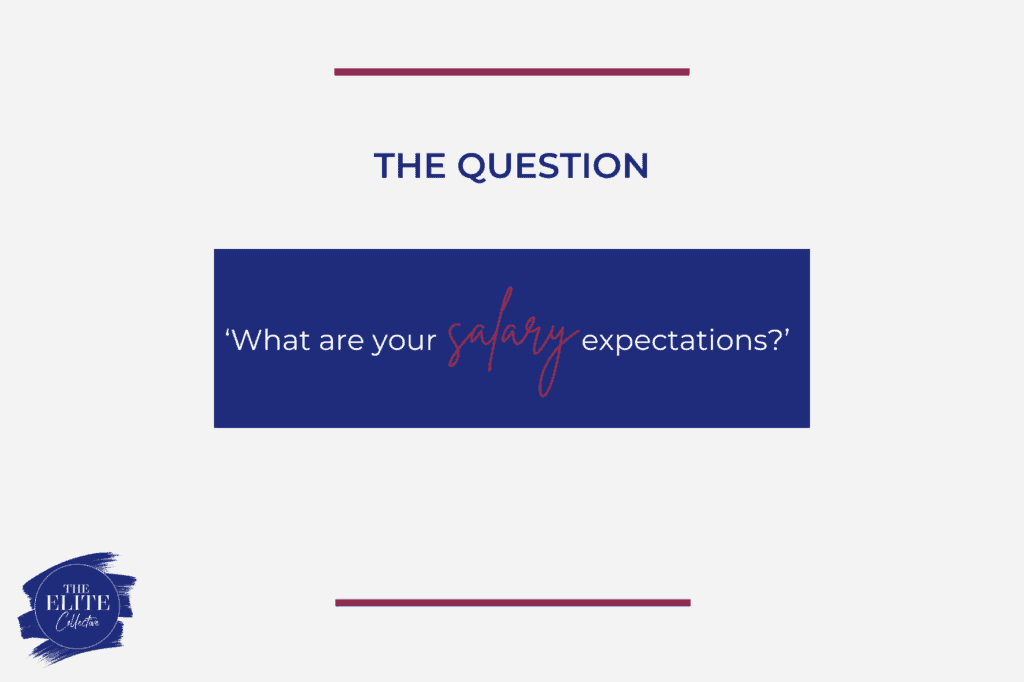 Adriana Modersitzki
Adriana Modersitzki

So, you found a fantastic role that genuinely excited you and engaged a professional resume writing service from the team at The Elite Collective.
You couldn’t believe the results, and because you outsourced the resume writing process, you were able to enjoy your weekend and submit your application with time to spare!
You’ve had a phone screen, undergone online testing, and been asked in for an interview.
The interview has gone incredibly well, and things are starting to wind up. Your interviewer is reviewing their notes, and you’re subtly wiping your palm on your trousers, ready to shake hands and say ‘goodbye’.
“Oh, one more thing. What are your salary expectations?”
Your heart starts pounding, and you begin some pretty impressive mental mathematics.
You might price yourself out of the role if you aim too high, but if you go too low, you could leave money on the table and undervalue yourself.
We’ve all been there. So, what do you do?
Let’s break it down together.

Hiring managers often pose this question for several reasons:
If your salary expectations are well outside their price range, then the hiring manager will most likely find someone with less experience to fill the position.
If your expectations exceed what they have budgeted, it may indicate you’re too junior for the role. As such, if your expectations are too high, then you may be overqualified.
BONUS: Another reason this can be asked is to see firsthand how you are articulating your value proposition and if you can negotiate confidently. In some roles, this could be highly relevant to the core duties and an indicator of your aptitude.
Understand that the degree to which you can negotiate will depend entirely on the immediate value-add you bring to the company or organisation. You’ll have more negotiation sway if you have a niche skillset, a specific security clearance or valuable connections. Suppose you’re a graduate or an entry-level employee, or there is a significant abundance of similarly qualified and experienced candidates. In that case, you will unlikely have as much bargaining power.
We all have vastly different communication styles, so there’s no one proper way to answer this question. There are a few tried and true approaches, though!
Depending on where you are in the interview or screening process, you may not yet have a detailed understanding of the role’s responsibilities or expectations. This can cover things like working weekends, overtime, or sales targets. If you need more time to research or understand the role, say so!
For example: ‘At this stage, I don’t feel like I know enough about certain specifics of the role to provide an accurate expectation. So that I can provide you with a salary range, can you please tell me more about *specific expectations* for this role?’
Rather than offering a specific number, sit within a RANGE. Remember that many employers will ‘hear and remember’
the lower end of your preference. So only give a number that you would be willing to take.
We suggest that when considering the salary range you will share, you bump it up to about 10% higher than you are willing to accept. That way, any counter offer will be closer to your goal. Keep in mind that this isn’t the time to be
greedy and add on a 50% margin. You don’t want to be ruled out as too expensive, overqualified or simply – greedy.
For example: “From what I understand about the role at this stage, I’d be looking for something in the area of $XX – $XX. I can be more specific when I better understand the role and company.”
If you aren’t comfortable disclosing a salary range QUITE YET, you can always flip the question and ask the recruiter what they are looking to pay for the role.
For example: “That’s a good question. As we’re still quite early in the process, it would be helpful if you could share what a person with my background, skills and qualifications typically earns in this position with your company.”
“I’d like to learn more about the position and duties, as well as what the team’s like, before discussing money. But may I ask what salary range you’re considering for this position?”
Never. Skip. The. Research.
Many employees underestimate the salary that their counterparts are earning elsewhere. This can prevent them from negotiating effectively when they do make a move.
Arm yourself with what average industry salaries look like, understand the economic climate you’re working within, and look for any hiring trends or skill shortages that affect your role type or industry.
Understanding how salary packages are calculated is another important step. The Seek Pay Calculator can help you work out the take-home pay for different salaries.
Salary is a primary motivator for the job seekers we work with, but it’s only one component. In recent years, more and more Australians have been seeking roles that provide a higher level of flexibility and a better work-life balance. Look beyond the numbers on your payslip, and assess the entire package on offer and the changes this new role would make to your lifestyle.
For example: Are you offered additional superannuation? A company car, phone or laptop? Are you eligible for corporate discounts on health insurance or a gym membership? Can you negotiate time for study?
Would you be able to use public transport to get to work, saving you expensive daily parking fees? Will your daily commute reduce significantly, giving you more time to pursue a hobby or pick the kids up from daycare?
Remember, the salary isn’t the only thing you can negotiate. Training and professional development, additional leave, and work-from-home days are all commonly negotiated parts of an overall package.
If you’ve gone through the screening and interviewing process, and you still aren’t certain about the salary or how certain specifics work, you will need to bring it up. This is tricky for several reasons, the main one being that the first person to ‘show their hand’ can lose bargaining power!
No matter what role you’re interviewing for, the application and interview process is your opportunity to have that
hiring manager thinking, “That’s who I want. Now, how can I get them to join us?” So spend time throughout the interview showing that you’re the best candidate for the role, and align yourself as closely as possible to what you know about their ideal candidate.
If the hiring manager can see how hiring YOU will deliver specific outcomes or make their life easier, they will likely be more generous during negotiations. So, rather than throwing out a figure or a range willy-nilly, we suggest you make a case for the salary range you seek.
When framing your business case, consider things from their perspective.
What IMMEDIATE value can you bring? What problems can you solve? Do you have any additional skills that will benefit them? Do you have connections or a network that is valuable to them? Do you have specific experience to help you hit
the ground running and deliver on tasks faster? Do you have any statistics or figures demonstrating the revenue you can generate?
Be prepared to negotiate – it’s a ‘salary negotiation’, after all. No one wants to be backed into a corner or screened out
as ‘too expensive’. The best negotiations are where everyone walks away feeling like a winner!
It’s important to note that hiring managers often don’t have any room to move with the actual salary. However, they might be able to come to the party in other ways, such as a laptop or phone, parking reimbursement, extra leave, flexible hours or working-from-home arrangements.
Salary negotiation is all part of the ‘new job’ process. As much as it can give you the shivers, it’s essential to know that most employers expect some negotiation. Knowing the value you add and holding firm to your expectations isn’t rude or demanding. Salary negotiation can be done respectfully and in a way that leaves everyone involved feeling good!
We will always encourage you to arm yourself with information and negotiate powerfully so that your next career move is profitable. However, we ALSO want to ensure your next career move is fulfilling.
Your job satisfaction depends on much more than the numbers on your payslip.
Research the company well, and make sure you download our latest free webinar for insight into how to align your values with your career. This will help you avoid burnout and build healthy workplace boundaries and balance, ensuring greater workplace satisfaction in the long term.
If you’re seeking a professional resume writing service that will support you in presenting the best version of yourself so that you get in front of decision-makers faster, we can help you.
At The Elite Collective, we create professional, highly converting resumes, cover letters, and pitch documents for career-driven professionals. Our team of professional writers will help you unpack your professional story and approach your job search with CONFIDENCE.
Whether it’s a professional resume, selection criteria or interview coaching – we’ve got you covered. Click through to explore our services and packages, or reach out for a free resume review and obligation-free quote.
Our team of professional resume writers are located across Australia, specifically in Canberra, Melbourne and Sydney. We have clients from Adelaide, Brisbane, Perth and across all areas of Australia who rave about our professional resume writing services, job application support and interview coaching.
When will we celebrate YOUR success story?
We respectfully acknowledge the traditional custodians of the land upon which we live and work, the Ngunnawal people.
We acknowledge and respect their continuing culture and the contribution they make to the life of this city and this region, and extend that same respect to all Aboriginal and Torres Strait Islander people.